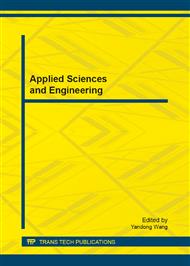[1]
Lin Dong-qing. Theory and Practice of Knowledge Management. Beijing: Electronic Industry Press, 2005. (Chinese).
Google Scholar
[2]
Xu Xue-guo, You Jian-xin, Peng Zheng-long, The Organizational Learning Model Based on Harmonious Mechanism,. Industrial engineering and management. No. 1, pp.14-17, 2006. (Chinese).
Google Scholar
[3]
Pan Kai-ling, Bai Lie-hu, Management Coordination Theory and Application, Beijing: Bjing Economic Management Publishing House, 2006. (Chinese).
Google Scholar
[4]
Ansoff H I. Corporate Strategy, revised edition. Penguin Books, (1987).
Google Scholar
[5]
Shi Li-ping, Lv Li, Dicussion on of coordinated effect of strategic alliances, Journal of Qiqihar University(Phi&Soc Sci), pp.30-31, May, 2004. (Chinese).
Google Scholar
[6]
Faulkner D, International strategic alliances: cooperation to compete. London: McGraw-Hill Book Company ,(1995).
Google Scholar
[7]
Yu Ya-feng, The Factors in Learning- Innovation System of U/I Collaboration and Its Function Relation Model, System s Engineering, vol. 21, No. 2 pp.34-38, 2003. (Chinese).
Google Scholar
[8]
Ye Lu, Pan Hong-liang, Liu Xiao-nong, The Affected Factors to Knowledge Sharing : A Literatwre Review, Journal of Intelligence, vol. 29, No. 7, pp.79-82, 2010. (Chinese).
Google Scholar
[9]
Zahra Tohidinia, Mohammad Mosakhani, Knowledge sharing behaviour and its predictors, Industrial Management & Data Systems, vol. 110, Iss: 4, p.611 – 631, (2010).
DOI: 10.1108/02635571011039052
Google Scholar
[10]
M Yoshimura, K Yoshikawa, Synergy Effects of Sharing Knowledge During Cooperative Product Design, Concurrent Engineering , vol. 6 No. 1 pp.7-14, (1998).
DOI: 10.1177/1063293x9800600102
Google Scholar
[11]
Bao Gong-min, Xu Bi-xiang, Knowledge Sharing Theory: A Literature Review, Journal of Chongqing University (Social Science Edition), vol. 13, No. 2, pp.43-49, 2007. (Chinese).
Google Scholar
[12]
Liu Yu, Sun Jing, Modeling of Knowledge Sharing between Organization and its Customers, Service Operations and Logistics, and Informatics, 2008. IEEE/SOLI 2008. Beijing, pp.12-15, October 2008. (Chinese).
DOI: 10.1109/soli.2008.4686361
Google Scholar
[13]
Jari Juga, Organizing for network synergy in logistics: A case study, International Journal of Physical Distribution & logistics Management, vol. 26, No. 2, pp.51-67, (1996).
DOI: 10.1108/09600039610113209
Google Scholar
[14]
Liu Xi-song, Wang Hui-po, Resear ch on Ecological Competition Model of Knowledge Shar ing in Organizations, Science &Technology Progress and Policy, vol. 24, No. 4, pp.144-146, April, 2007. (Chinese).
Google Scholar
[15]
Guo Li, Su Jing-qin, Stability Analysis of Industrial Symbiosis Based on Logistic Equation, Forecasting, vol. 24, No. 1, pp.25-30, 2005. (Chinese).
Google Scholar


